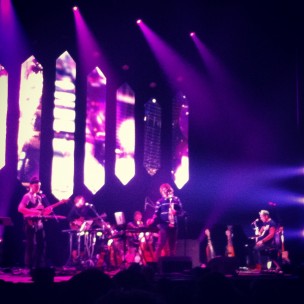
Sufjan Stevens’ new album, Carrie and Lowell, is just about the most devastatingly intimate thing I’ve ever heard. There are hushed, whispered vocals, tracks that were recorded on an iPhone, the distinctive hum of an air conditioner in the background; but the kicker is the content, as Sufjan mourns his mother, chronicles his own self-destructive tendencies, and ultimately finds a reason to live through memory, faith, and beauty. So when I filled my car with friends and left campus to see these songs performed live, I wasn’t looking for a good time.
On Sunday, April 13, 2015, Stevens continued his tour at The Bushnell Center for the Performing Arts in Hartford, Connecticut. I had my tickets before Carrie and Lowell was even released, and I had no idea what to expect. But I knew that I wanted revelation.
Before that revelation, there was the opening act, Cold Specks. Propelled by the sheer force of vocalist Al Spx, Cold Specks was a worthy beginning to the night. The band operated in a musical niche worth exploring, a hybrid of stripped down indie and gospel. The muted, percussive instrumentals that underscored Spx’s voice made for an impressive, hypnotic, digestible set. Cold Specks’ half hour set culminated with Spx, alone on stage, armed with a guitar, potently protesting the turmoil and police brutality against black life. Since the artist following her would play songs about inner life and emotional trauma, it was good to begin by looking outward and around before plunging into one man’s private life.
A change of set, an opening of a curtain, and Stevens took the stage. Wearing a “Hustler” shirt and a green cap, head down, he quietly sat at a piano and plunked out the arrhythmic, lovely chords to “Redford,” opening his mouth to unleash the quiet ethereal stream of his voice into The Bushnell. His band, small in number, swiftly walked to their various instruments, and joined his call. Then there were a few seconds of silence, a switching of instruments, a light shift, and the true opening performance. With the assistance of spare, lovely acoustic and slide guitar, Stevens played a rendition of “Death With Dignity,” Carrie and Lowell’s devastating opener.
Stevens then proceeded to play the entirety of his new album, rearranging the music in ways that were sometimes natural, sometimes surprising, and always beautiful. The song “All of Me Wants All of You,” on the album consisting merely of a single acoustic guitar, was repurposed effectively into slow, energized electropop. “Drawn to the Blood” a beautiful, painful meditation on Christian folklore and personal sanity, was performed solo, while Stevens was bathed in red light. The line “he called me Subaru,” from album-highlight “Eugene,” was met with a rare laugh from an otherwise quiet, focused audience. The mystical but harshly real conversation across the grave in “Fourth of July,” on album a dirge of ambient techno and quiet piano, was transformed into an act of both defiance and submission, as the final line “we’re all gonna die” repeated over increasingly amplified post-rock instrumentation: squelching synths, pounding drums, thick guitar. Some of these songs were just too delicate and fragile to play live the way they were on record. Smartly, Stevens and his band created versions that could translate to a live audience, without sacrificing the immense emotional weight.
It was clear that Stevens felt the intensity of his own music as much as I did. Often, his vocal lines wavered, cracked, dipped, or raised in pitch. I at first attributed this to a lack of training or a weak voice, but after hearing perfect renditions of non-album tracks later into the night, it became apparent the cause of these missed notes and wrong pitches: these songs were physically and emotionally painful for Stevens to sing. It is incredibly generous, then, that he still endeavors to share them with audiences. After playing for over an hour, he addressed the audience for the first time to state that this tour has been “an uphill battle” for him. Watching the footage displayed on a picket-fence shaped monitor behind the band—home movies, skylines, mountain ranges, flat heart monitors—was like looking into the mind of another person. It was the perfect externalization of the most intimate and internal release of the year.
Standout performances of the night came one after the other. Sitting alone at a piano, Stevens performed “The Owl and the Tanager,” a seven-minute track I had never heard before. It was as virtuosic as it was honest: beautiful fluttering chords, devastating lyrics, and incredible vocal control. Hearing this song for the first time in this setting was a gift.
But the true gift was the song that followed. Carrie and Lowell album closer “Blue Bucket of Gold” began relatively faithful to the original recording, but then the lyrics ended, and the band came in. What followed was a 10-minute coda of noise rock, set to the dance of two disco balls and a dozen lights, rising continually until the end. It was overwhelming in its volume, scope, and beauty; it was the moment that Carrie and Lowell’s whisper truly became a band. At the end of its ascension I felt lighter, as if something had been purged from me.
Ultimately, that’s what the night was: a cathartic experience for the man on stage. If it was someone without Sufjan Stevens’ considerable talent, this would not have made for a great concert, but in his hands, it felt like a privilege. When the show ended in a joyous rendition of “Chicago,” it felt like an earned moment of celebration for an artist giving everything he’s got.


Leave a Reply